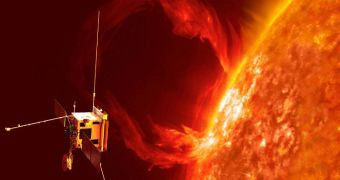Aerospace company Astrium UK was selected by the European Space Agency (ESA) for building the Solar Orbiter, a spacecraft created to study the Sun starting in 2017. The contract was signed on April 26, during ceremonies marking the 50th anniversary of UK presence in space.
The next-generation spacecraft's main mission will be to figure out how the star creates and controls the heliosphere, its extended atmosphere. Though numerous observatories are currently trained on the Sun, solar physicists are still in the dark about numerous aspects of the star, including this one.
The new contract was signed by the ESA Director of Science and Robotic Exploration, professor Alvaro Giménez Cañete, and the National Director of Earth Observation, Navigation and Science at Astrium UK, Miranda Mills.
With the completion of this step, the development and construction of Solar Orbiter can begin. Astrium UK will not be alone in its efforts. Rather, it will coordinate a consortium of European companies, each of which will be tasked with creating certain components for the spacecraft.
Current estimates place the probe's cost at somewhere around €300 million ($395.6 million). This is one of the largest contracts ever signed between a UK-based company and the ESA Science Program.
The principal science investigators for this mission were selected from a number of countries, including France, Germany, Italy, Spain, Switzerland, Belgium, the UK and the United States. Solar Orbiter will carry a suite of ten high-tech scientific instruments.
“Today ESA awarded a very important contract in the space science domain to Astrium’s spacecraft design and build facility at Stevenage in the UK,” Giménez Cañete said at the ceremony yesterday.
“This is testimony to the important role that the UK has played in space flight since the launch of Ariel-1 in 1962 and it is testimony to the important role that the UK continues to play in space science,” the ESA official went on to add.
Over the years, ESA has been involved in a number of solar missions, either in partnership with NASA, or on its own. These include the Helios 1 and 2 spacecraft, Ulysses, PROBA-2 and the Solar and Heliospheric Observatory (SOHO).
Solar Orbiter is being developed to answer one of the major scientific questions included in the ESA Cosmic Vision 2015–2025 program. Officials with the agency say that previous solar missions were critical towards paving the way for the new spacecraft.
“Solar Orbiter is a fantastic mission. It will help us understand how the Sun, essential to almost all life on Earth, forms the heliosphere and the origin of space weather, which can have an enormous influence on our modern civilization,” Giménez Cañete concluded.

 14 DAY TRIAL //
14 DAY TRIAL //